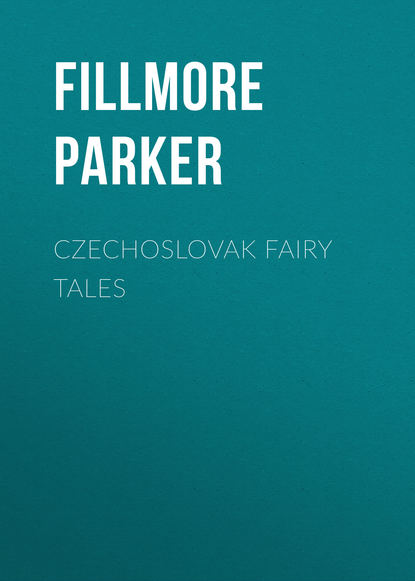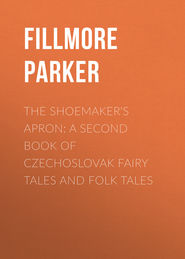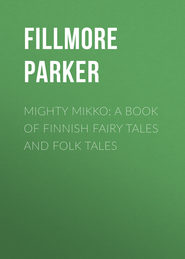По всем вопросам обращайтесь на: info@litportal.ru
(©) 2003-2024.
✖
Czechoslovak Fairy Tales
Настройки чтения
Размер шрифта
Высота строк
Поля
The farmer kept on bowing and the two sons looked down, too embarrassed to speak.
At length the handsome young lord said: “What, don’t you know your own son, Kubik, whom you used to beat for stealing when he showed you his betrothal gifts?”
At that the old man looked at him closely and cried out: “Bless my soul, I believe it is our Kubik! But who could recognize the boy!.. And is this his bride? That settles it! Kubik shall have the farm! Kubik has brought home the most beautiful bride!”
“Kubik doesn’t need the farm,” the old queen said, “nor will you need it any longer nor your other sons. You will all come home with us to our kingdom over which Kubik is now king. And may God grant you many years to live on in peace and quiet.”The farmer was overjoyed at this arrangement. He embraced his son, and his son’s bride, and his son’s royal mother-in-law.He gave his farm to the poorest man in the village and then he and his sons accompanied Kubik back to his kingdom. There he lived long in peace and comfort enjoying the thought that good fortune had come to them all on account of his determination not to divide the farm.The poor man who inherited the farm prayed for him and his sons every night and never tired of telling the story of how Kubik became a king and his brothers courtiers.So for many years the memory of Kubik was kept green. Now people are beginning to forget him, so I thought it was time that I tell his story again.
“Kubik doesn’t need the farm,” the old queen said, “nor will you need it any longer nor your other sons. You will all come home with us to our kingdom over which Kubik is now king. And may God grant you many years to live on in peace and quiet.”
The farmer was overjoyed at this arrangement. He embraced his son, and his son’s bride, and his son’s royal mother-in-law.
He gave his farm to the poorest man in the village and then he and his sons accompanied Kubik back to his kingdom. There he lived long in peace and comfort enjoying the thought that good fortune had come to them all on account of his determination not to divide the farm.
The poor man who inherited the farm prayed for him and his sons every night and never tired of telling the story of how Kubik became a king and his brothers courtiers.
So for many years the memory of Kubik was kept green. Now people are beginning to forget him, so I thought it was time that I tell his story again.
GRANDFATHER’S EYES
THE STORY OF THREE WICKED YEZINKAS
GRANDFATHER’S EYES
ONCE upon a time there was a poor boy whom everybody called Yanechek. His father and mother were dead and he was forced to start out alone in the world to make a living. For a long time he could find nothing to do. He wandered on and on and at last he came to a little house that stood by itself near the edge of the woods. An old man sat on the doorstep and Yanechek could see that he was blind, for there were empty holes where his eyes used to be.
Some goats that were penned in a shed near the house began bleating and the old man said:
“You poor things, you want to go to pasture, don’t you? But I can’t see to drive you and I have no one else to send.”
“Send me, grandfather,” Yanechek said. “Take me as your goatherd and let me work for you.”
“Who are you?” the old man asked.
Yanechek told him who he was and the old man agreed to take him.
“And now,” he said, “drive the goats to pasture. But one thing, Yanechek: don’t take them to the hill over there in the woods or the Yezinkas may get you! That’s where they caught me!”
Now Yanechek knew that the Yezinkas were wicked witches who lived in a cave in the woods and went about in the guise of beautiful young women. If they met you they would greet you modestly and say something like “God bless you!” to make you think they were good and kind and then, once they had you in their power, they would put you to sleep and gouge out your eyes! Oh, yes, Yanechek knew about the Yezinkas.
“Never fear, grandfather, the Yezinkas won’t get me!”
The first day and the second day Yanechek kept the goats near home. But the third day he said to himself: “I think I’ll try the hill in the woods. There’s better grass there and I’m not afraid of the Yezinkas.”
Before he started out he cut three long slender switches from a blackberry bramble, wound them into small coils, and hid them in the crown of his hat. Then he drove the goats through the woods where they nibbled at leaves and branches, beside a deep river where they paused to drink, and up the grassy slopes of the hill.
There the goats scattered this way and that and Yanechek sat down on a stone in the shade. He was hardly seated when he looked up and there before him, dressed all in white, stood the most beautiful maiden in the world. Her skin was red as roses and white as milk, her eyes were black as sloe berries, and her hair, dark as the raven’s wing, fell about her shoulders in long waving tresses. She smiled and offered Yanechek a big red apple.
“God bless you, shepherd boy,” she said. “Here’s something for you that grew in my own garden.”
But Yanechek knew that she must be a Yezinka and that, if he ate the apple, he would fall asleep and then she would gouge out his eyes. So he said, politely: “No, thank you, beautiful maiden. My master has a tree in his garden with apples that are bigger than yours and I have eaten as many as I want.”
When the maiden saw that Yanechek was not to be coaxed, she disappeared.
Presently a second maiden came, more beautiful, if possible, than the first. In her hand she carried a lovely red rose.
“God bless you, shepherd boy,” she said. “Isn’t this a lovely rose? I picked it myself from the hedge. How fragrant it is! Will you smell it?”
She offered him the rose but Yanechek refused it.
“No, thank you, beautiful maiden. My master’s garden is full of roses much sweeter than yours and I smell roses all the time.”
At that the second maiden shrugged her shoulders and disappeared.
Presently a third one came, the youngest and most beautiful of them all. In her hand she carried a golden comb.
“God bless you, shepherd boy.”
“Good day to you, beautiful maiden.”
She smiled at Yanechek and said: “Truly you are a handsome lad, but you would be handsomer still if your hair were nicely combed. Come, let me comb it for you.”
Yanechek said nothing but he took off his hat without letting the maiden see what was hidden in its crown. She came up close to him and then, just as she was about to comb his hair, he whipped out one of the long blackberry switches and struck her over the hands. She screamed and tried to escape but she could not because it is the fate of a Yezinka not to be able to move if ever a human being strikes her over the hands with a switch of bramble.
So Yanechek took her two hands and bound them together with the long thorny switch while she wept and struggled.
“Help, sisters! Help!” she cried.
At that the two other Yezinkas came running and when they saw what had happened they, too, began to weep and to beg Yanechek to unbind their sister’s hands and let her go.
But Yanechek only laughed and said: “No. You unbind them.”
“But, Yanechek, how can we? Our hands are soft and the thorns will prick us.”
However, when they saw that Yanechek was not to be moved, they went to their sister and tried to help her. Whereupon Yanechek whipped out the other two blackberry switches and struck them also on their soft pretty hands, first one and then the other. After that they, too, could not move and it was easy enough to bind them and make them prisoners.
“Now I’ve got the three of you, you wicked Yezinkas!” Yanechek said. “It was you who gouged out my poor old master’s eyes, you know it was! And you shall not escape until you do as I ask.”
He left them there and ran home to his master to whom he said: “Come, grandfather, for I have found a means of restoring your eyes!”
He took the old man by the hand and led him through the woods, along the bank of the river, and up the grassy hillside where the three Yezinkas were still struggling and weeping.
Then he said to the first of them: “Tell me now where my master’s eyes are. If you don’t tell me, I’ll throw you into the river.”
The first Yezinka pretended she didn’t know. So Yanechek lifted her up and started down the hill toward the river.
That frightened the maiden and she cried out: “Don’t throw me into the river, Yanechek, and I’ll find you your master’s eyes, I promise you I will!”
So Yanechek put her down and she led him to a cave in the hillside where she and her wicked sisters had piled up a great heap of eyes – all kinds of eyes they were: big eyes, little eyes, black eyes, red eyes, blue eyes, green eyes – every kind of eye in the world that you can think of.










